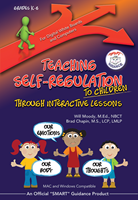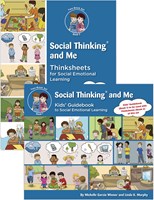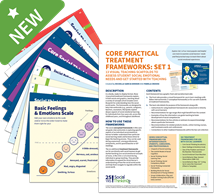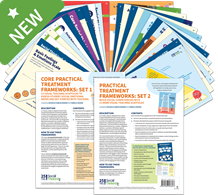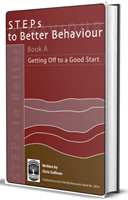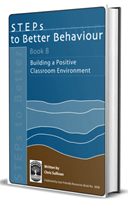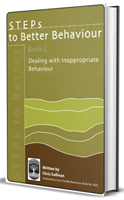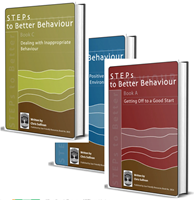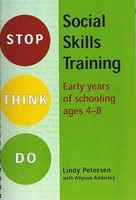Author: Dominique BaudryAges: 8-11Format: GamePublished: 2013Make thinking, talking, and learning about the social world fun!Should I? or Shouldn't I? Revised Elementary School Edition is designed to give children a fun and motivating way to discuss age-relevant issues and their own thoughts, perspectives & choices in a non-judgmental and safe setting. Players explore how their social interpretations might impact their own actions and reactions, using social situations that elementary-aged...
£71.98
£64.78
Author: Dominique BaudryAges: 12-18+Format: GamePublished: 2021Revised and updated with the all-new Social Interpretation Scale, this game stimulates authentic peer-based discussions on a wide range of teen-friendly and relevant social situations that engage them in thinking and talking about social problem solving for responsible decision making. Shift students’ focus from discussing how someone behaved to instead learning about the power of their own social interpretation within a fun, safe,...
£71.98
£64.78
Ages: 5 - 12Format: CD Data Disc (MAC and Windows Compatible)Flash Player Lessons with PDF Lesson PlansBy: Will Moody and Brad ChapinUnique Interactive Lessons Designed for Use on Computers and Digital Whiteboards such as SMART Boards and Promethean Boards.These highly interactive lessons are designed to teach students the skills, strategies, and behaviours they need to regulate their own physical, emotional, and cognitive processes.Melting Freeze (Regulate BODY)Animal Movements (Regulate...
£53.28
By Michelle Garcia Winner and Linda K. MurphyWhether you're new to Social Thinking or a veteran in using our materials, Social Thinking and Me is the perfect tool to introduce and teach core Social Thinking Vocabulary and concepts to older primary school and middle/secondary school-age kids (ages 9-14).This two-book set breaks larger and more complicated social concepts down into smaller chunks to make it easier for adults to teach and easier for kids to learn. What's Great About This Two-Book...
£69.99
13 visual teaching scaffolds to assess student social emotional needs and get started with teachingCreated by Michelle Garcia Winner and Pamela CrookeStart unpacking the social world with Core Practical Treatment Frameworks: Set 1, part of a two-set collection of 26 visual teaching scaffolds for social learning and self-regulation strategies—curated and distilled for the first time in one practical and user-friendly collection. After 25 years of research, teaching, and learning, we have powerful...
£29.99
Build social competencies with 13 more visual teaching scaffoldsCreated by Michelle Garcia Winner and Pamela CrookePeople are complicated and so is the huge social world. Here are 13 more of our most helpful and popular teaching frameworks in a portable, user-friendly set to help social learners ages 4 – adult build social competencies across a wide range of social landscapes. Tried, tested, and perfected over 25 years, these visual supports dissect complex social concepts into user-friendly...
£29.99
A Two-Set Collection of 26 Visual Teaching Scaffolds for Social Learning & Self-RegulationCreated by Michelle Garcia Winner and Pamela CrookeThe social world is vast and complex, kids are complicated, and there’s so much information! Here’s where you’ll find the best of the Social Thinking® Methodology distilled into a two-set collection of our 26 core teaching frameworks for helping social learners unpack and figure out how to navigate the social world in a concrete, visual way. This...
£59.98
£53.99
Getting Off to a Good StartBy Chris SullivanThis STEPs to Better Behaviour series comprises the following three books:Book A: Getting Off to a Good Start introduces the first part of the STEPs approach, which concerns how you can establish a positive behaviour management system at the start of the school year. Central to establishing a positive framework are routines, rules, physical environment, curriculum and establishing positive relationships. Key beliefs in the STEPs philosophy are that a...
£18.18
Building a Positive Classroom EnvironmentBy Chris SullivanThis STEPs to Better Behaviour series comprises the following three books:Book A: Getting Off to a Good Start introduces the first part of the STEPs approach, which concerns how you can establish a positive behaviour management system at the start of the school year. Central to establishing a positive framework are routines, rules, physical environment, curriculum and establishing positive relationships. Key beliefs in the STEPs...
£18.18
Dealing with Inappropriate BehaviourBy Chris SullivanThis STEPs to Better Behaviour series comprises the following three books:Book A: Getting Off to a Good Start introduces the first part of the STEPs approach, which concerns how you can establish a positive behaviour management system at the start of the school year. Central to establishing a positive framework are routines, rules, physical environment, curriculum and establishing positive relationships. Key beliefs in the STEPs philosophy are...
£18.18
By Chris SullivanThis STEPs to Better Behaviour series comprises the following three books:Book A: Getting Off to a Good Start introduces the first part of the STEPs approach, which concerns how you can establish a positive behaviour management system at the start of the school year. Central to establishing a positive framework are routines, rules, physical environment, curriculum and establishing positive relationships. Key beliefs in the STEPs philosophy are that a school needs a shared ethos...
£50.00
By Lindy Petersen with Mark LeMessurier STOP THINK DO is a social skills programme for use in schools with children who have emotional–social–behavioural difficulties that affect their ability to make friends. It is designed as a classroom curriculum for children to prevent such difficulties arising. Originally designed for Australian schools, it is now internationally recognised as an invaluable social skills programme and is being used by many schools and CPD groups around the world. STOP...
£58.00
By Lindy Petersen Stop and Think Learning offers teachers a step-by-step method called STOP THINK DO to motivate children to learn in the classroom. The highly successful method shows children what they can change and then how they can plan what to do to change. Motivation is the key: here is a set of strategies that actively involve the children in a commitment to learn in the busy classroom. The book also describes the STOP THINK DO method for training social skills and improving relationships...
£21.80
By Lindy Petersen with Phil Lewis STOP THINK DO is a social skills programme for use in schools with children who have emotional–social–behavioural difficulties that affect their ability to make friends. It is designed as a classroom curriculum for children to prevent such difficulties arising. Originally designed for Australian schools, it is now internationally recognised as an invaluable social skills programme and is being used by many schools and CPD groups around the world. STOP THINK DO...
£46.80
By Lindy Petersen with Allyson Adderley STOP THINK DO is a social skills programme for use in schools with children who have emotional–social–behavioural difficulties that affect their ability to make friends. It is designed as a classroom curriculum for children to prevent such difficulties arising. Originally designed for Australian schools, it is now internationally recognised as an invaluable social skills programme and is being used by many schools and CPD groups around the world. STOP...
£46.80
By Lindy Petersen with Allyson Adderley STOP THINK DO is a social skills programme for use in schools with children who have emotional–social–behavioural difficulties that affect their ability to make friends. It is designed as a classroom curriculum for children to prevent such difficulties arising. Originally designed for Australian schools, it is now internationally recognised as an invaluable social skills programme and is being used by many schools and CPD groups around the world. STOP...
£46.80
By Julie Mendenhall This book can be used as a guided tool to be read with children. It provides an entertaining, endearing lesson for young people about their brain and how they can better use it to make good decisions.First, Sunny teaches the importance of our brain and how it works. Then, Sunny teaches two very simple-to-use techniques that children can use to help them better self-regulate their behavior.1. CHECK: Learn when I need to change my behavior.2. CRISSCROSS and SHIFT: Learn how to...
£13.20
By Julie Mendenhall Here is a book to be used as a guided tool. It helps children understand the difference between tattling and telling but more importantly, it brings an awareness of the sensitive subject of abuse. This subject is not easily approached but with the main character, Sunny, it can support an adult in delivering a CRUCIAL MESSAGE. This resource includes an appendix with discussion questions and tips for parents. Age Suitability: 4-9
£13.20
Author: Janet BruceAlthough developing appropriate social skills is a challenging task for any child, every teacher knows that many children in the classroom require further support and instruction. This Superb Social Skills in the Classroom series aims to encourage critical social skills in children from the ages of 5 to 10 years. Its activities provide children with structured learning opportunities to play and practice social skills they have learnt. Topics covered include friendship,...
£22.73
Out of stock
Author: Janet BruceAlthough developing appropriate social skills is a challenging task for any child, every teacher knows that many children in the classroom require further support and instruction. This Superb Social Skills in the Classroom series aims to encourage critical social skills in children from the ages of 5 to 10 years. Its activities provide children with structured learning opportunities to play and practice social skills they have learnt. Topics covered include friendship,...
£22.73
Out of stock
February 2020 Update - Online Purchase Order Accounts Now Available
Click the link below to find out how to order online with your purchase Order acount.
We also accept official purchase orders by post or email and will send invoices with the goods.
Sign up for our Newsletter

© 2024 Thinking Books
Thinking Books Ltd VAT Number: GB291 2552 05



